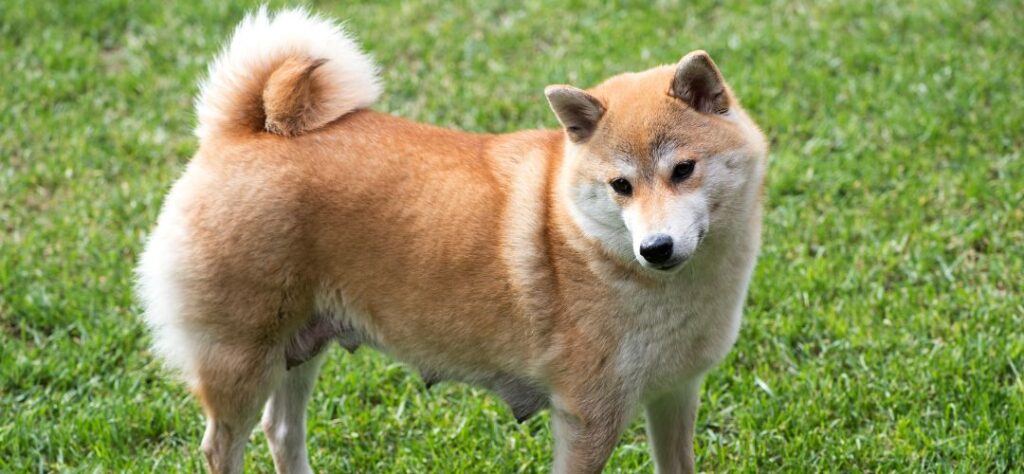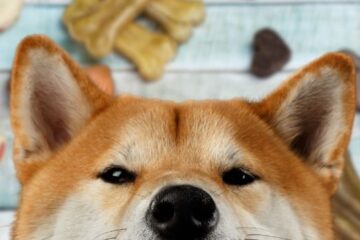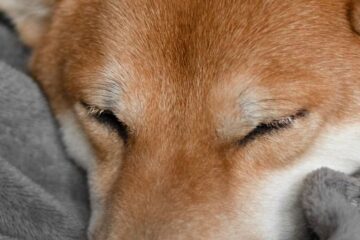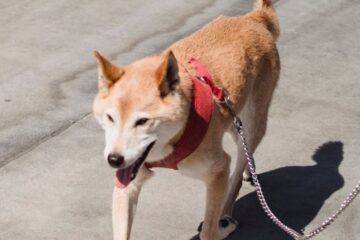Introduction to Shiba Inu Behavior
If you’re a Shiba Inu lover, understanding the behavior of this unique breed is crucial. Shiba Inus are known for their spirited personality, intelligence, and independence. Let’s delve into the fascinating world of Shiba Inu behavior.
-
- Overview of Shiba Inu breed traits
The Shiba Inu is a small to medium-sized breed, originally bred for hunting in the mountainous regions of Japan. They are one of the oldest and smallest native Japanese dog breeds. Their compact, muscular body, bushy tail, and fox-like face are distinctive features. But it’s their personality traits that truly set them apart.
Shiba Inus are known for their alertness, agility, and boldness. They are also known for their independent nature, which can sometimes be mistaken for stubbornness. They are intelligent and can be trained, but they also have a mind of their own and like to do things their way.
Shiba Inus are also known for their unique vocalization, often referred to as the “Shiba scream”. This is a high-pitched howl they use to express happiness, excitement, or frustration.
Learn more about Shiba Inu breed traits on Wikipedia.
-
- Importance of understanding Shiba Inu behavior traits
Understanding the behavior traits of your Shiba Inu is essential for a harmonious relationship. This understanding can help you provide the right training, socialization, and care for your Shiba Inu.
For instance, their independent nature means they may not always follow commands, so training should focus on positive reinforcement. Their alertness and agility make them great escape artists, so a secure yard is important. Their boldness can sometimes lead to aggression if not properly socialized.
Understanding these traits can also help you appreciate the unique personality of your Shiba Inu and deepen your bond with them.
In the following sections, we’ll explore the Shiba Inu temperament, personality traits, and behavior in different environments. We’ll also share case studies and key takeaways to help you better understand your Shiba Inu.
Understanding Shiba Inu Temperament
Shiba Inus are known for their unique temperament, which sets them apart from other dog breeds. They possess a distinct blend of traits that make them both endearing and challenging to their owners. Let’s delve into the general Shiba Inu temperament traits.
General Shiba Inu Temperament Traits
Shiba Inus are renowned for their independence, intelligence, and agility. These traits are integral to their personality and behavior.
1. Independence
Shiba Inus are highly independent dogs. They enjoy their own company and can often be seen exploring their surroundings on their own. This independence can sometimes be mistaken for aloofness, but it’s simply a part of their nature. Shiba Inus are not overly clingy and can entertain themselves when their owners are busy. Wikipedia further explains this trait.
2. Intelligence
Shiba Inus are incredibly intelligent. They are quick learners and have a keen sense of understanding their environment. This intelligence, combined with their independent nature, can sometimes lead to stubbornness. However, with consistent training and socialization, they can be taught to follow commands and behave appropriately.
3. Agility
Shiba Inus are agile and energetic dogs. They love to run, play, and explore. This agility makes them excellent companions for active individuals or families. It’s important to provide them with plenty of exercise to keep them healthy and happy.
In conclusion, understanding the Shiba Inu’s temperament is key to forming a strong bond with your furry friend. Their independence, intelligence, and agility make them unique and fascinating pets. Remember, every Shiba Inu is different, and these traits can vary from dog to dog. The key is to embrace their individuality and provide them with the love and care they deserve.

Shiba Inu’s Natural Temperament
Understanding the natural temperament of a Shiba Inu can help you better connect with your furry friend. Let’s delve into the key aspects of their nature:
- Alertness: Shiba Inus are naturally alert dogs. They are always aware of their surroundings and quick to respond to changes. This trait makes them excellent watchdogs. They are always on guard and ready to protect their family. However, this alertness can also make them a bit wary of strangers. It’s important to socialize your Shiba Inu from a young age to help them feel comfortable around new people and situations. [source]
- Confidence: Confidence is a hallmark of the Shiba Inu breed. These dogs carry themselves with a certain poise and assurance that is hard to miss. They are not easily intimidated and will stand their ground when necessary. This confidence can sometimes be mistaken for aggression, but it’s simply a part of their bold personality. Training and socialization can help channel this confidence in a positive direction. [source]
- Stubbornness: Shiba Inus are known for their stubborn streak. They like to do things their own way and can be resistant to change. This trait can make training a bit of a challenge. However, with patience and consistency, you can teach your Shiba Inu to follow commands. Remember, it’s important to make training sessions fun and rewarding for your Shiba Inu to keep them engaged. [source]
In conclusion, understanding these natural temperament traits – alertness, confidence, and stubbornness – can help you build a stronger bond with your Shiba Inu. Remember, every dog is unique and may not exhibit all these traits to the same degree. It’s important to spend time with your Shiba Inu and understand their individual personality.
Shiba Inu Personality Traits
Understanding the personality traits of a Shiba Inu is crucial for any potential owner. These dogs have a unique blend of characteristics that make them both charming and challenging. Let’s delve into some of the positive traits of a Shiba Inu.
Positive Traits of a Shiba Inu
Shiba Inus are known for their distinct personality traits. These traits make them a favorite among dog enthusiasts. Here are some of the positive traits that make Shiba Inus stand out:
1. Loyalty
Shiba Inus are incredibly loyal to their families. Once they form a bond with their owners, it’s unbreakable. They are known to go to great lengths to protect their loved ones, making them excellent family pets. This loyalty, however, means that they can be wary of strangers, so early socialization is essential.
2. Playfulness
Shiba Inus are full of energy and love to play. Whether it’s a game of fetch or a walk in the park, these dogs are always up for some fun. Their playful nature makes them great companions for families with children. However, their energy levels also mean they need plenty of exercises to keep them happy and healthy.
3. Adaptability
One of the most admirable traits of a Shiba Inu is their adaptability. They can adjust to different environments and situations with ease. Whether you live in a city apartment or a house with a big yard, a Shiba Inu can adapt and thrive. This adaptability makes them a great choice for families who move often or live in diverse environments.
In conclusion, Shiba Inus are loyal, playful, and adaptable dogs. They make great pets for families who can provide them with the love, care, and exercise they need. Understanding these positive traits can help potential owners prepare for the joy and challenges of owning a Shiba Inu.
Challenging Shiba Inu Personality Traits
While Shiba Inus are known for their loyalty, playfulness, and adaptability, they also possess some personality traits that can be challenging for their owners. These traits include aggressiveness, dominance, and shyness. Understanding these traits can help you better manage your Shiba Inu’s behavior and create a harmonious living environment.
-
- Aggressiveness
Shiba Inus can sometimes display aggressive behavior, especially when they feel threatened or uncomfortable. This can manifest in growling, barking, or even biting. It’s important to note that this is not a sign of a ‘bad’ dog, but rather a response to a situation they find stressful. Early socialization and consistent training can help manage this trait. Wikipedia provides more information on this.
-
- Dominance
Shiba Inus are known for their independent and dominant nature. They like to be in charge and can sometimes be stubborn, making training a bit of a challenge. However, with patience and positive reinforcement, you can establish a healthy relationship with your Shiba Inu where they understand you’re the leader.
-
- Shyness
While some Shiba Inus are outgoing and friendly, others can be quite shy and reserved, especially around strangers or in new environments. This shyness can sometimes be mistaken for aloofness. It’s important to respect your Shiba Inu’s comfort zone and gradually expose them to new experiences to help them build confidence.
Remember, every Shiba Inu is unique and may not exhibit all these traits. Understanding your Shiba Inu’s personality and providing them with a loving, supportive environment can help them become well-adjusted and happy pets.
Shiba Inu Characteristics in Different Environments
Shiba Inus are adaptable dogs that can thrive in various environments. However, their behavior can differ based on their surroundings. Let’s explore how Shiba Inus behave at home.
Shiba Inu Behavior at Home
At home, Shiba Inus show their true colors. They are known for their loyalty, intelligence, and independent nature. Here are some key aspects of their behavior at home:
-
- Interaction with Family Members
Shiba Inus are very loyal to their family members. They are known to form strong bonds with their human companions and can be protective of them. However, they can be a bit reserved and may not be as affectionate as other breeds. They are also known to be good with children, but it’s always important to supervise interactions between dogs and young kids.
-
- Behavior Around Other Pets
Shiba Inus can be a bit territorial and may not get along with other pets at first. They are known to be a bit dominant, especially with other dogs of the same sex. However, with proper socialization and training, they can learn to coexist peacefully with other pets. It’s important to introduce them to other animals gradually and in a controlled environment.
Understanding your Shiba Inu’s behavior at home can help you provide a comfortable and safe environment for them. Remember, every Shiba Inu is unique, and their behavior can vary based on their individual personality and experiences.
Shiba Inu Characteristics in Different Environments
Shiba Inu Behavior in Public
Shiba Inus are known for their bold and spirited nature, which can be quite evident in public settings. However, their behavior can vary depending on the situation. Let’s delve into their interactions with strangers and their behavior in dog parks.
Interaction with Strangers
Shiba Inus are often wary of strangers. They are not typically the type of dogs that will run up to anyone they don’t know. Instead, they tend to be reserved and cautious. This is a trait that stems from their history as hunting dogs in Japan, where they needed to be alert and wary of their surroundings. However, with proper socialization from a young age, Shiba Inus can learn to be more comfortable around unfamiliar people.
It’s important to note that every Shiba Inu is unique and their reaction to strangers can vary. Some may be more outgoing than others. As a Shiba Inu owner, it’s essential to respect your dog’s comfort zone and not force interactions.
Behavior in Dog Parks
Shiba Inus can be quite playful and energetic in dog parks. They enjoy running around and exploring their surroundings. However, they can also be territorial and may not get along with all dogs. This is why it’s crucial to keep a close eye on your Shiba Inu in a dog park setting.
Shiba Inus are known to have a strong prey drive. This means they might chase after smaller animals or dogs. It’s always a good idea to have your Shiba Inu on a leash unless you’re in a secure, fenced area.
Remember, regular visits to the dog park can be a great way for your Shiba Inu to socialize and burn off energy. However, it’s important to ensure these experiences are positive and safe for your dog and others.
In conclusion, understanding your Shiba Inu’s behavior in public is key to ensuring they are comfortable and well-behaved. With patience, understanding, and proper socialization, your Shiba Inu can thrive in various public settings.
Case Studies: Shiba Inu Temperament and Behavior
Let’s dive into some real-life examples to understand the temperament and behavior of Shiba Inus in different environments.
-
- Case Study 1: Shiba Inu in a multi-pet household
Meet Max, a Shiba Inu who lives in a house with two cats and a parrot. Initially, Max was a bit territorial and had a hard time sharing his space. But with consistent training and socialization, Max learned to coexist peacefully with his fellow pets. This case study shows that while Shiba Inus may be a bit territorial, they can learn to live harmoniously in a multi-pet household with proper training and patience.
-
- Case Study 2: Shiba Inu with young children
Next, let’s talk about Bella, a Shiba Inu who lives with a family with two young children. Bella is gentle and patient with the kids, always ready to play and engage in fun activities. However, the family ensures that the children understand Bella’s boundaries and respect her space. This case study demonstrates that Shiba Inus can be great companions for children, provided the children are taught to respect the dog’s space and boundaries.
-
- Case Study 3: Shiba Inu in an apartment setting
Lastly, we have Taro, a Shiba Inu living in a city apartment. Taro has adapted well to apartment living, thanks to his owners who ensure he gets plenty of exercise and mental stimulation. They also trained Taro from a young age to minimize his vocalizations, which is crucial in an apartment setting. This case study shows that with proper exercise and training, Shiba Inus can adapt to living in smaller spaces like apartments.
In conclusion, Shiba Inus are adaptable and can thrive in various environments, from multi-pet households to apartments. However, they require consistent training, socialization, and understanding from their owners to ensure they are happy and well-behaved.
Key Takeaways: Understanding Your Shiba Inu
As we conclude our deep dive into the world of Shiba Inus, let’s summarize the most important points to remember. These key takeaways will help you better understand and care for your Shiba Inu.
Importance of Early Socialization
Early socialization is crucial for your Shiba Inu’s development. This breed can be somewhat aloof and reserved, so exposing them to a variety of people, environments, and other animals from a young age can help them become more comfortable and confident. According to Wikipedia, early socialization can also prevent behavioral issues later in life.
Training Strategies for Shiba Inu Characteristics
Shiba Inus are intelligent, independent, and sometimes stubborn. Training strategies should be tailored to these characteristics. Positive reinforcement methods work best, as Shiba Inus respond well to rewards and praise. Consistency and patience are also key. Remember, every dog is unique, so what works for one Shiba Inu might not work for another.
Understanding and Managing Shiba Inu Temperament Traits
Understanding your Shiba Inu’s temperament traits is essential for a harmonious relationship. Shiba Inus are known for their spirited and good-natured personalities, but they can also be stubborn and independent. They require a firm, consistent hand in training. Managing these traits involves understanding their needs, providing plenty of mental and physical stimulation, and setting clear boundaries.
In conclusion, understanding your Shiba Inu’s unique characteristics and temperament can greatly enhance your relationship with them. Remember, patience, consistency, and early socialization are key. With the right approach, your Shiba Inu will be a loyal, loving, and entertaining companion.


